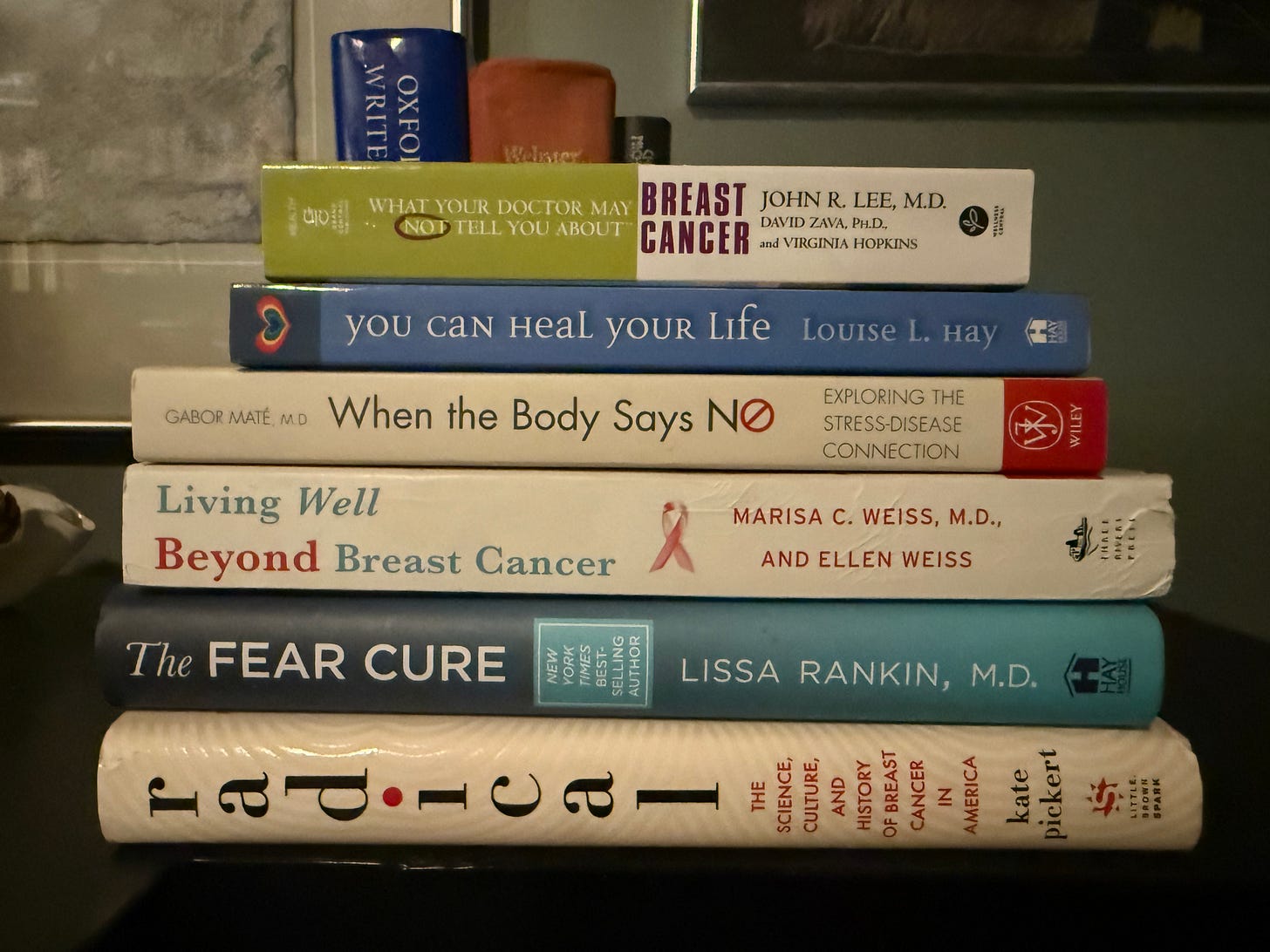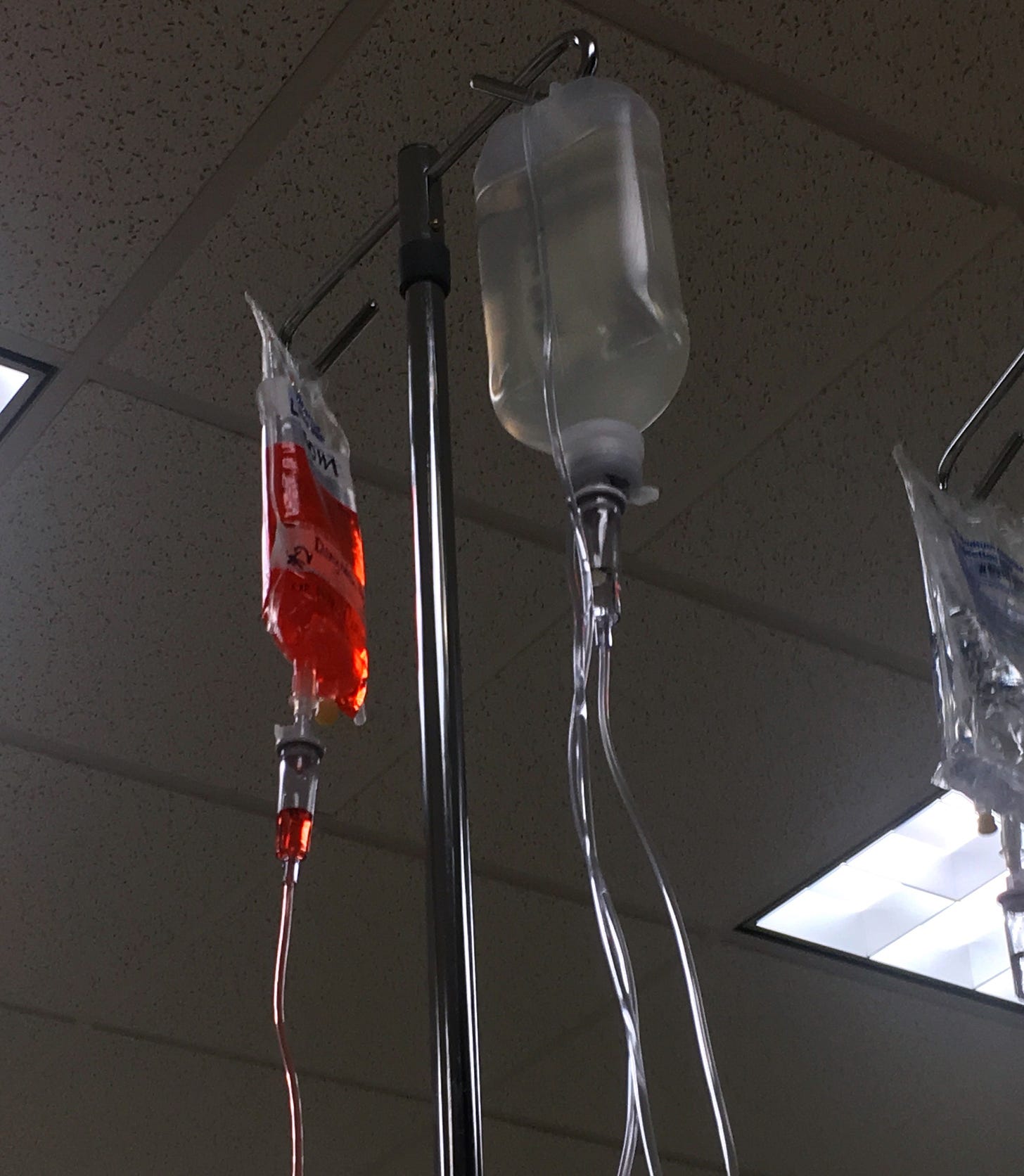Cancer is the last thing I want to talk or think about, but here we are again with a good friend just diagnosed with breast cancer. It’s ridiculous the number of people I know who have or had any kind of cancer. I’m sure it’s the same for you.
Dealing with cancer is akin to having a thousand leaks in your roof with a monsoon barreling down on you. Or imagine being on a paddle board in the middle of the ocean navigating the driving rain, gale force winds, and monstrous waves, says my doctor, Dr. Connealy, author of The Cancer Revolution and founder of The Cancer Center for Healing. A cancer survivor must remain “unflappable” in the face of her diagnosis, she says, after the initial shock and inevitable come apart.
Every day, hundreds of people tell their partners, parents or children about their terrifying news. On an hourly basis, dozens of mothers, fathers, brothers, and sisters have their lives completely upended by this life-changing news. Every year, millions of individuals across the globe have been diagnosed with every cancer possible and are living through various stages of treatment.
I am one of these faceless statistics eight years from my original shock of hearing, “It’s cancer.” In my case, it was early-stage breast cancer.

Here’s what I’d tell someone who recently heard a nurse or doctor say those god-awful words, “It’s cancer.”
No matter your diagnosis, you have more time than you think. A diagnosis is a rough and raw moment, but you can take the time to consider your choices. It took several weeks for my genetic testing results to be returned. Waiting for the results gave me a chance to respond and consider my options instead of reacting in the chaos of fear and panic. Despite the stage and sense of urgency, take the time to consult a second or third opinion.
Doctors are guides, not gods.
You will witness some of the best the medical profession has to offer, and you will be stunned by the worst of the American healthcare system. Doctors are doing the best they can, but they are traumatized by a system which has overloaded them with too many patients, too many profit incentives for dispensing certain protocols, and too much oversight by heartless insurance companies. Doctors have biases, different personalities and beliefs about the best treatments. You need someone who isn’t offended if you ask questions and act as an informed advocate for yourself.
Keep impeccable records of medical records, appointments, and bills.
You’re caught in a maddening corporate goliath of different departments with no idea what another department is doing, so stay vigilant about your medical records, appointments, and bills. Obtain copies of all records. Read them closely. Follow up on any and everything. Don’t wait for the nurse or assistant to call you. Call the office first. Keep a record of bills and what you’ve paid, when, and how. More than once, I’ve told the billing department that if the disease didn’t kill me, they’re relentless billing for services already paid or manufactured years after the procedure would.
Record your appointments and question everything.
Your life is at stake. Despite the queasy stomach and sweat-soaked shirt, when you find yourself in yet another doctor’s office, don’t let the doctor dismiss your questions or diminish your right to know and your right to choose what you do.
Research, research, research.
Read books, talk to people, and explore the internet. You have to do a deep dive to become your own advocate. There’s an overwhelming amount of information to consider, so there will be periods in which you’re inundated in your search for understanding and times when you will need to step back for your own sanity. The universe has a way of providing the best people and sources of information when you need it. Trust that.
Trust your gut instinct.
This whole experience is about faith and trust. But not blind faith in the current medical system. Trust how you react to the different doctors and their treatments. This is your greatest guide. No matter the statistics or the studies or the lack thereof.
Eliminate all toxins.
A cancer survivor once said that being diagnosed with cancer means looking at yourself and your life as if the way you were living was killing you. So not only are you trying to survive on a physical level, you need to look at how toxic your diet might be, your job, or your friends and family. You’re also embarking on a spiritual and emotional boot camp. Clean up everything in your life and let go of what’s not serving you.
I went on a restaurants, relatives and red wine diet good ole hubby Hugo says.
Nurture yourself.
When you’re on your journey back to health, your focus is you and no one else now. Women who get breast cancer tend to over nurture others. Of course, you’re not abandoning your family, but be the one to receive help when you want and need it.
There’s not one perfect way out of this maze, only the path you decide is right for you.
Every choice has a risk and a downside. There’s the “gold standard” of traditional medicine, and there are incredible and exciting new discoveries happening daily with immunotherapy and other alternative treatments, but not one doctor will be able to say, “If you do this, you’re guaranteed a long life.” You must decide what makes sense for your body, budget, and life.
Living in Prognosis.
Now you’ve faced your death in a way you’ve never been forced to before, and you’re “living in prognosis.” In other words, you learn to be comfortable with the uncertainty of each day, but you also learn to experience the gift and joy each morning brings by simply being alive with a renewed sense of childlike wonder and a very real sense of gratitude.

A sampling of books I found helpful:
The Cancer Revolution: A Groundbreaking Program to Reverse and Prevent Cancer Leigh Erin Connealy (An updated version will be published soon.)
Radical Remission: Surviving Cancer Against All Odds Kelly Turner
When the Body Says No: Exploring the Stress-Disease Connection Gabor Mate
The Fear Cure Lissa Rankin
What Your Doctor May Not Tell You About Breast Cancer John Lee
Radical Remission: The Science, Culture, and History of Breast Cancer in America Kate Pickert
A Boob’s Life Leslie Lehr
You Can Heal Your Life Louise Hays
One last thought: You can’t heal in the same place you got sick. Mentally, physically, emotionally or spiritually. Sometimes literally. The same year of my diagnosis, we moved from our beautiful house, which had been in our family for 100 years. But that story is for another day, and you can read about it when my completed memoir is published one day.
Until then, stay tuned for further episodes…
Copyright Lanier Isom 2025, All Rights Reserved






I somehow missed this part of your life. I am amazed you've been able to function and write and produce and keep going with all of that going on. I've been fortunate not to have cancer but recently had my own life-threatening illness. I found your words helpful. Thank you!
Thank you, Lanier🙏 Wish we had your words to guide by back in the day when my mother fought a losing breast cancer battle 💟